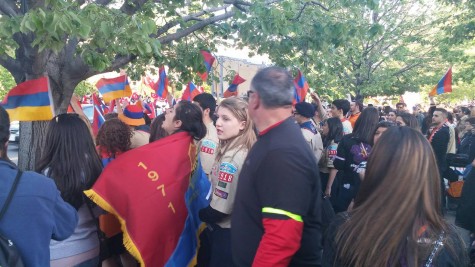On 100th Anniversary of Armenian Genocide, Hrant Dink remembered
April 24, 2015
![]() A hundred years of denial though diplomatic coercion, and civil oppression by the Turkish government have elapsed since the Armenian Genocide began on April 24, 1915, resulting in highly limited recognition, reparation, and reconciliation. Both the brave efforts which have been made towards these latter three ends and the nationalism and ethnic hatred which have impeded them are typified in the life of Armenian-Turkish journalist Hrant Dink. On January 19, 2007, Dink was gunned down by Ogün Samast, a seventeen-year-old Turkish nationalist, outside the Istanbul offices of his bilingual newspaper Agos — vengeance for his recognition of the Armenian Genocide and advocacy for minority rights in a country bent on ethnic homogeneity.
A hundred years of denial though diplomatic coercion, and civil oppression by the Turkish government have elapsed since the Armenian Genocide began on April 24, 1915, resulting in highly limited recognition, reparation, and reconciliation. Both the brave efforts which have been made towards these latter three ends and the nationalism and ethnic hatred which have impeded them are typified in the life of Armenian-Turkish journalist Hrant Dink. On January 19, 2007, Dink was gunned down by Ogün Samast, a seventeen-year-old Turkish nationalist, outside the Istanbul offices of his bilingual newspaper Agos — vengeance for his recognition of the Armenian Genocide and advocacy for minority rights in a country bent on ethnic homogeneity.
Dink and several associates established Agos in 1996, at the urging of Archbishop Karekin II Kazanjian, then the Armenian Patriarch of Constantinople. The newspaper, unique for its dual publication in Armenian and Turkish, was founded with two objectives: to counter negative portrayals of the Armenian community in mainstream Turkish media, and to integrate Armenians more thoroughly into the country’s political discourse. Always critical, but never militant, Agos dedicated itself to advocating “integration without assimilation” for Armenians and calling to attention undemocratic practices by the Turkish government.

Protesters outside of the Turkish Embassy in Washington D.C.
With Dink as editor-in-chief, the paper gradually grew in circulation, raised a generation of Armenian journalists, fostered greater community cohesion, and won respect from many Turkish intellectuals. At the same time, however, Agos and its journalists suffered backlash from the government and certain parts of the public. The paper was twice banned from circulation, and Dink was prosecuted three times under the infamous Article 301 of the Turkish Penal Code, which makes “denigrating Turkishness [or] the Government of Turkey” punishable by up to three years in prison.
But there is still hope for Turkish democracy, and for the nation’s minorities, so long there remain activists such as Hrant Dink who persist in publishing the truth.
— Thomas Toghramadjian, Columns Editor
As a result of these trials, and the media circuses surrounding them, Dink developed a reputation as an enemy of the Turkish state, despite his insistence that his activism stemmed from a sense of duty, as a Turkish citizen, from a desire to build the nation up as opposed to tearing it down. Death threats began pouring in by the hundreds. In his final article for Agos, Dink confessed to feeling a sensation of “psychological torture,” – not only at the threat of death, but at the damage wrought by prosecution to his journalistic reputation.
Nonetheless, he never lost faith in the Turkish people. “I may see myself as frightened as a dove,” he wrote, “but I know that in this country people do not touch doves.” In one sense, this assurance was proven tragically unfounded; Samast assassinated him on the day of the article’s publication. But in the aftermath of Dink’s death, hundreds of thousands of Turks gathered publicly to repudiate the ultra-nationalism and hate that motivated his killer. “We are all Hrant Dink,” a common placard read. “We are all Armenian.”
Yet the authorities responsible for Dink’s prosecution and murder have remained firmly entrenched. According to Amnesty International in 2012, “security services knew of the murder plot and were in communication with those accused of the murder yet nothing was done to stop it taking place.” The same report notes that the Turkish government, despite appeals by the Dink family and European Court of Human Rights, has failed to conduct an investigation into “the actions of state institutions and officials implicated in the murder.” Current Turkish President Recep Tayyip Erdoğan has continued a policy of denial toward the Armenian Genocide, used the word “Armenian” as a derogatory term, and cemented his nation’s place in the world’s cellar where press freedoms are concerned.
But there is still hope for Turkish democracy, and for the nation’s minorities, so long there remain activists such as Hrant Dink who persist in publishing the truth. There is still hope, so long as there remain people who see no contradiction between loving their nation and loving their neighbor, who prefer the discomfort of clear-eyed patriotism to the delusion of reactionary politics and historical revisionism. As Turks, Armenians, and the world move forward into a century which promises more active genocide prevention and greater justice for the victims of crimes against humanity, Hrant Dink’s legacy should inspire others to the same open-hearted courage which drove his activism.